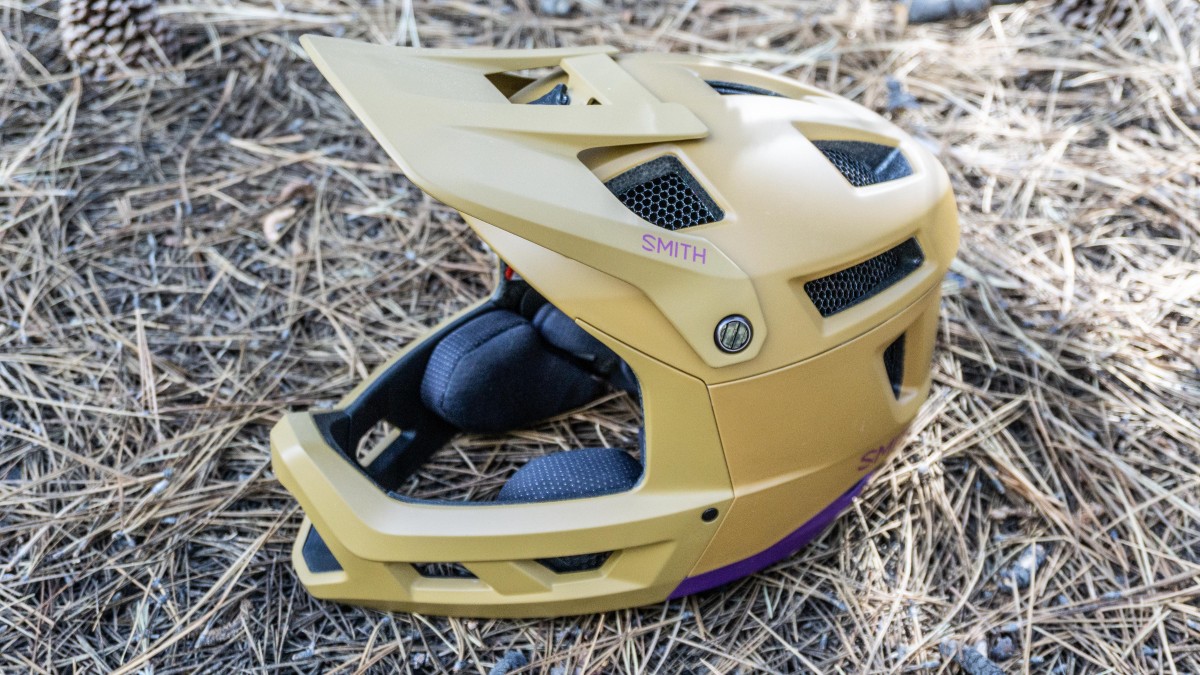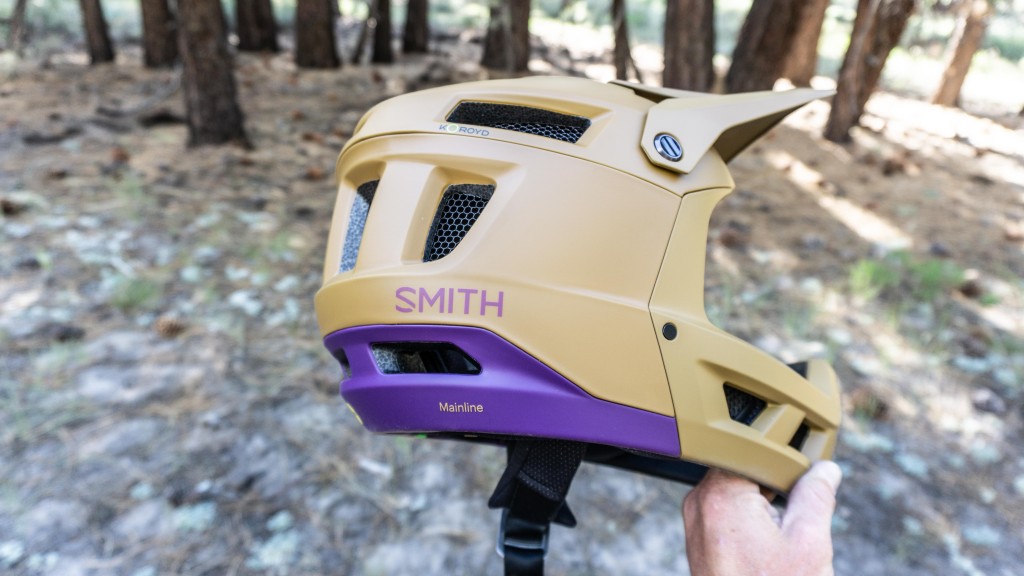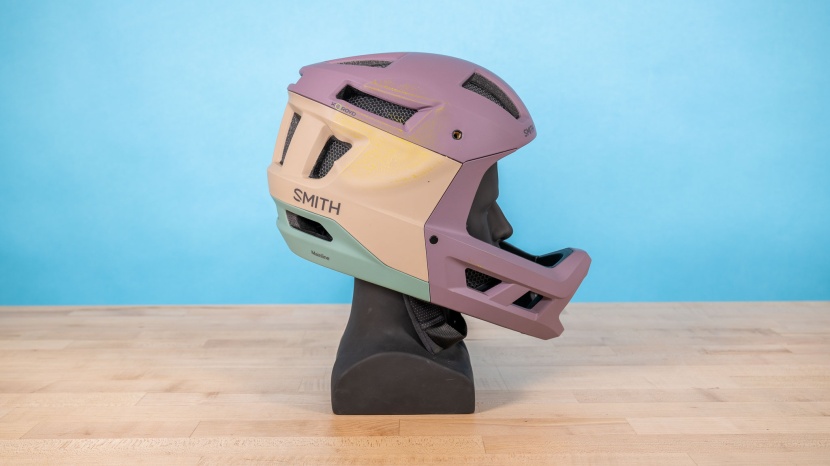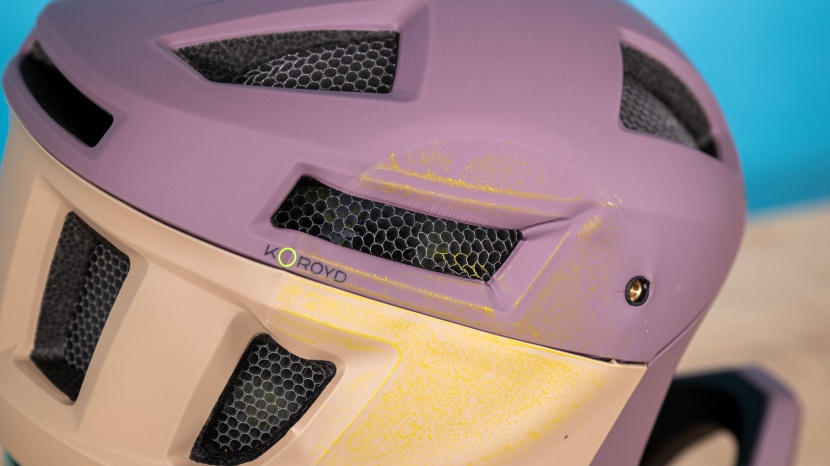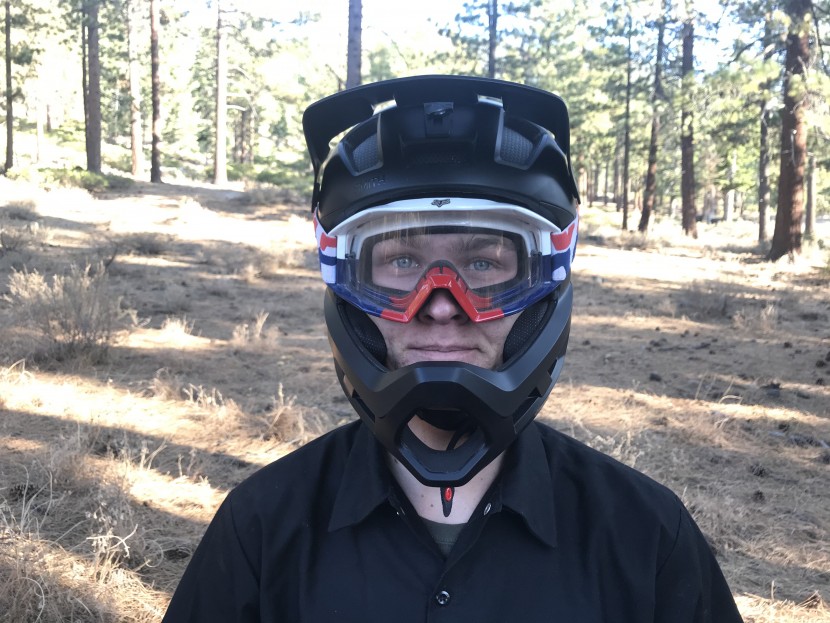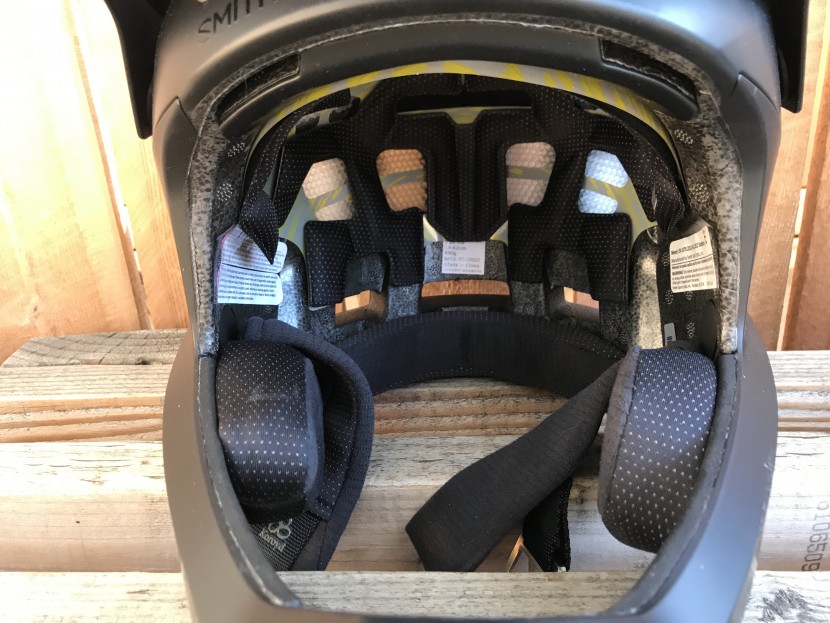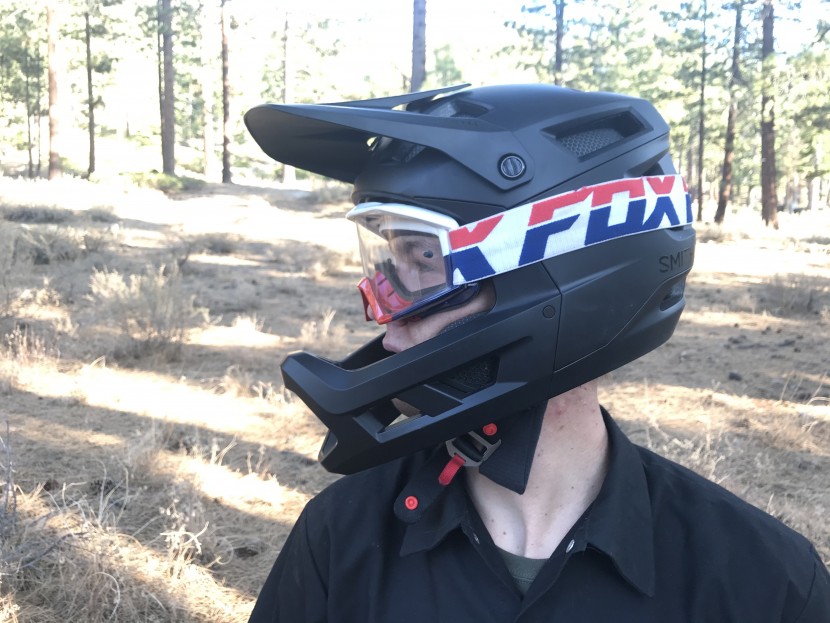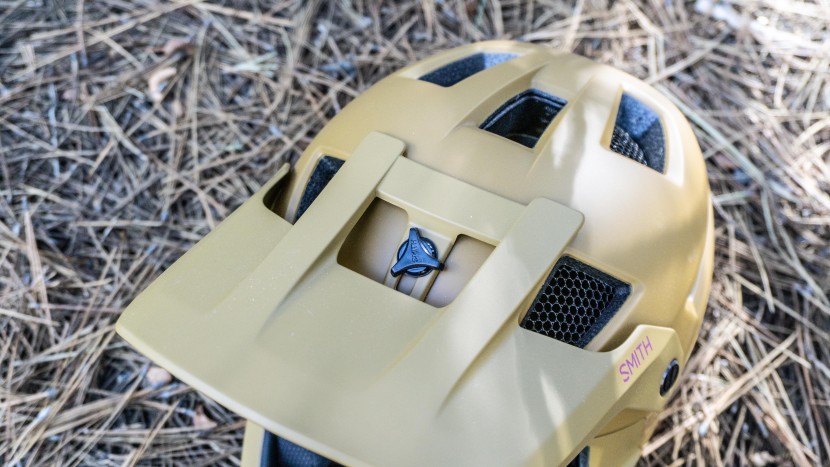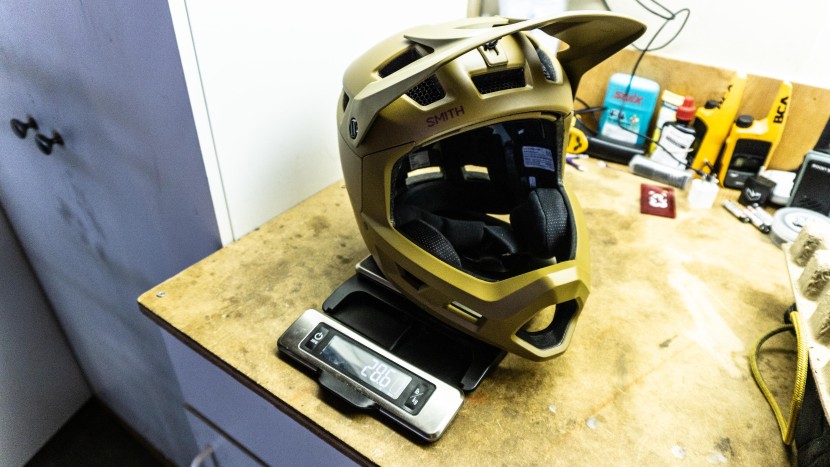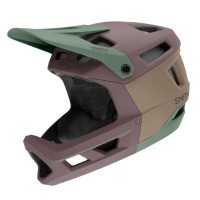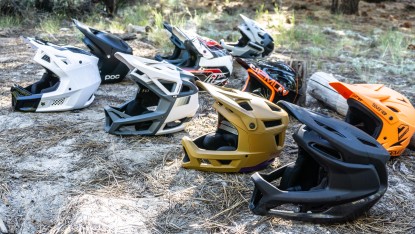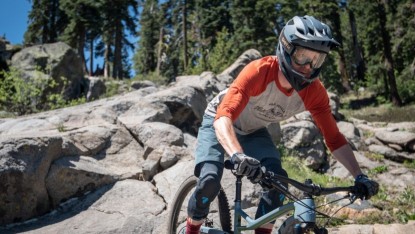
Our Verdict
Our Analysis and Test Results
The Smith Mainline has become something of a cult classic in the downhill bike community. It's comfy, it breathes well, and it's got great looks. While it doesn't boast the best drop test results, it's got the safety certifications we want to see in a full face helmet, and is a worthwhile option for the enduro rider.
Impact Test
The Mainline didn't post the best numbers in impact testing, and its sensor data was less impressive. This helmet, like others in this test, has been certified by higher safety standards than just the CPSC. It includes the downhill-specific ASTM F1952 and the e-bike-specific NTA8776, and it should be considered safe.
What we aim to unveil in our lab testing is the nuances of crash performance. We conduct specific high and low-speed crash tests and analyze the collected data, knowing that most of us want to wear a helmet with above-average performance. The Mainline didn't perform nearly as well as the other helmets we crushed. In our slow impact test, it was bested by every other helmet we tested. In the fast impact test, the Mainline performed slightly better but still finished in the lower performance quadrant of our test group.
Rather than the ubiquitous EPS (expanded polystyrene foam), Smith uses a Koroyd honeycomb material as the base for the helmet's protection, which they cite as a way to keep the weight down and the ventilation up. This helmet is equipped with the MIPS system, which stands for Multi-Directional Impact Protection System. It features a yellow and gray layer resembling plastic underneath the padding. This slip layer allows the helmet to shift slightly during an angled impact, helping to reduce the rotational forces transferred to the rider's brain.
Comfort
If there's one aspect where the Mainline truly excels, it's comfort. We found this helmet exceptionally comfortable to wear all day; according to our testers, it is the most comfortable helmet we tested.
The Mainline offered an excellent out-of-the-box fit, with our large test helmet running true to size. If you're between sizes, it's best to try one on before purchasing or consider sizing up. Even after extended use and heavy sweating, the padding maintained its shape and didn't compress or lose volume. Smith also provides extra pads in the box for a more customized fit, though our testers with larger heads didn't find any adjustment necessary.
We loved the fit of the Mainline around our ears, and Smith truly was thoughtful in their padding layout, striking a great balance between cushion and ventilation. It's rare to describe a helmet as both cushy and breathable, but the Mainline is just that.
Ventilation
The Mainline offers impressive ventilation with 21 vents that facilitate airflow throughout the helmet. Beneath all the vents on the front, top, and back lies Koroyd—a porous, honeycomb-like material that provides both coverage and impact protection while permitting air to pass through. This was a strong metric for the Mainline and is one of its best attributes.
Between the outer shell and the Koroyd, channels direct air from the front to the back of the helmet. Three intake vents at the front draw cool air in, while multiple vents on the top and rear allow warm air to escape, ensuring effective airflow and comfort. The chin bar has five open vents to allow for great airflow when you are standing up and hammering on the pedals. These chin bar ports aren't quite as gigantic as some of the enduro-focused helmets but they're big enough to allow generous air flow to the chin and neck areas.
Usability
This helmet is compatible with both goggles and sunglasses. Many enduro riders prefer to stash their goggles above the helmet's brow while climbing, but the limited adjustment range of the Mainline's visor doesn't allow for this. Instead, riders will need to either wear their goggles around their neck or position them backward on the helmet when not in use. The Mainline features an adjustable visor that's ideally sized—not too long or too narrow—measuring about 6.75 inches wide at the tip. It can be adjusted up or down by approximately one inch using a central thumbscrew.
The Mainline comes equipped with a drawstring helmet bag and several extra pads in varying sizes, enabling riders to fine-tune the helmet's fit as needed. During our testing, we noticed no unusual signs of wear, showing off the helmet's craftsmanship. We have no major reservations about its durability with the shell, foam, and Koroyd all in decent shape at the end of testing. Besides some sweat stains, the foam also held up well.
Weight
The Mainline weighs 28.6 ounces, making for one of the lighter helmets in the lineup. We found this to be particularly helpful for wearing during pedal-intensive rides.
While it doesn't have the heavier-duty construction of a downhill-only helmet, its modest weight makes it a great, versatile option that can handle many different flavors of downhill mountain biking.
Should You Buy the Smith Mainline?
We feel the Mainline is a good value. Yes, it is a little more expensive than some of the other enduro-oriented full-face helmets, but we feel that the quality and comfort level helps justify the price tag. We also feel that the Mainline is practical in a huge number of situations which enhances its value. The Smith Mainline helmet combines a lightweight shell with excellent breathability and a protective feel. Outside of true enduro racing, this helmet should work well in a ton of situations including pedal-y shuttles and gnarly hike-a-bike trails. Yes, it is a little pricey, but we feel the design, build, and overall quality justifies the cost, and we feel this is an excellent option for the rider seeking a well-ventilated full-face.
What Other Full Face Helmets Should You Consider?
If you're wanting a model that's got better impact test scores, look at the pedal-friendly Specialized Gambit. If you're hunting for a full face option that performs a bit better in the bike park, consider the Fox Proframe RS.
| Awards | Best for Comfort |
|---|---|
| Price | $350 List Check Backcountry (on sale!) |
Overall Score  |
|
| Star Rating | |
| Bottom Line | A thoughtfully designed helmet that’s incredibly comfortable and stylish |
| Pros | Top-notch comfort, breathable, more durable than other enduro-focused options, lightweight |
| Cons | Not suited for frequent bike park duties, impact test scores not as ideal |
| Rating Categories | Smith Mainline Mips |
| Impact Test (30%) | |
| Comfort (20%) | |
| Ventilation (20%) | |
| Usability (15%) | |
| Weight (15%) | |
| Specifications | Smith Mainline Mips |
| Measured Weight (Large) | 28.6 oz |
| Number of Vents | 21 |
| Shell Material | Polycarbonate |
| Rotational Impact Protection System | Mips |
| Downhill-Specific Certification (ASTM-1952-DH) | Yes |
| Sizes | S, M, L |


